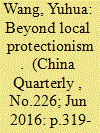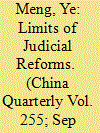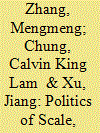| Srl | Item |
| 1 |
ID:
146511


|
|
|
|
|
| Summary/Abstract |
This article presents a large-scale, systematic study of politically connected firms in China. It was conducted by compiling a database of all the publicly traded firms in China in 1993, 2002 and 2012 that codes the biographies of hundreds of thousands of board members. I find that there has been a significant increase in the percentage of firms that are connected with the national government in the last 20 years. This casts doubt on a popular argument that businesses in China have primarily relied on “local protectionism.” I interpret this as a result of firms' need to connect with powerful and stable institutions. I test this by examining the impact of the fall of Chen Liangyu on firms in Shanghai.
|
|
|
|
|
|
|
|
|
|
|
|
|
|
|
|
| 2 |
ID:
192631


|
|
|
|
|
| Summary/Abstract |
This article investigates the implementation effects of China's recent reforms to centralize its court system and offers an explanation of why such centralization efforts largely failed. Drawing upon in-depth interviews with judicial personnel from four localities, the study shows that local courts’ structural dependence upon same-level party-states is perpetuated or, in some cases, is even exacerbated, despite the unprecedented reform plans to centralize the budgetary and personnel management of the judicial system. Further investigation finds that, contrary to what existing assessments suggest, implementation failure is less a result of regional disparities in resources than of the party-state's own reliance on its horizontal line of power concentration and hierarchy, which is a core feature of the Chinese Communist Party's (CCP) one-party rule and hinders the party-state's own attempts to strengthen both judicial autonomy and centralization. The article thus challenges two extant notions on recent political-legal developments in China – that the CCP regime has substantially centralized its judiciary along the vertical line, and that judicial autonomy can continue to increase and manifest both under the conditions of, and serving the purpose of, deepening one-party authoritarianism.
|
|
|
|
|
|
|
|
|
|
|
|
|
|
|
|
| 3 |
ID:
175562


|
|
|
|
|
| Summary/Abstract |
The recent proliferation of China's railways has posed challenges to the dominance of the national-level railway authority on railway development. Since the 2000s, the planning of new railways has evolved into a politics of scale in which actors across multiple scales of government have bargained over railway alignment and station siting for their respective interests. This politics is shaped by the uneven bargaining powers of the contending state agents over railway planning. Interscalar division of regulatory oversight over strategic resources for railway development enables state agents at some scales to bargain more successfully, whereas variations in administrative and economic standing further differentiate the interscalar bargaining powers of municipal governments. Different results of bargaining across scales for each city have produced, as intercity railway planning in the Pearl River Delta illustrates, significant intercity variations in average travel times to the stations for the new railways that these cities share. Owing to the peculiar scalar distribution of the costs and benefits of the new railways, municipal governments with greater bargaining power have, contrary to traditional wisdom, bargained for less accessibility to intercity railway stations.
|
|
|
|
|
|
|
|
|
|
|
|
|
|
|
|
| 4 |
ID:
114559


|
|
|
|
|
| Publication |
2012.
|
| Summary/Abstract |
China is without a doubt the world's leading infringer of intellectual property rights (IPRs). China's factories produce counterfeit and pirated products for local and foreign consumption while China's domestic industry infringes patent rights with relative impunity - this despite nearly 30 years of improving laws for the protection and enforcement of IPRs as well as accession to the World Trade Organization in 2001. This brief article seeks to understand the reasons behind China's apparent failure to adequately enforce its IPRs. Finding local protectionism a major impediment to enforcement efforts, the article further analyses whether the central government has the power to enforce IPRs or whether it is powerless to confront and challenge local interests.
|
|
|
|
|
|
|
|
|
|
|
|
|
|
|
|